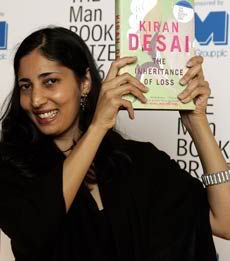 Loss is a word. Not an action; a feeling in shades of darkness. To say Kiran Desai's Man Booker Prize winning effort deals about loss is an understatement. The book itself gives new definition to word loss: all the characters lose something: the setting loses, everyone loses. In between highlighting the various guises loss can take Desai manages to slip in themes of globilization and white dominance, of loneliness as an unwanted foreigner.
Loss is a word. Not an action; a feeling in shades of darkness. To say Kiran Desai's Man Booker Prize winning effort deals about loss is an understatement. The book itself gives new definition to word loss: all the characters lose something: the setting loses, everyone loses. In between highlighting the various guises loss can take Desai manages to slip in themes of globilization and white dominance, of loneliness as an unwanted foreigner.
The story opens with a teenager, Sai, living with her grandfather Jemubhai the Retired Judge, his dog, Mutt, and a cook. They sit around, the mist encroaching, nothing to do, looking forward to ... what? Nothing.
And on silent feet rebels approach their house, their aim the Judge's cache of hunting guns.
For a novel that opens so promisingly like a love story set in a period of insurgency Desai's novel quickly moves to state its purpose: I am here to tell about LOSS. Let us take a look at these case studies....
Yes, the content is like that of a text book.
Sai is in love with Gyan, her math tutor, and Desai's beautiful prose narrate their meetings with such innocence it pains the heart - awkward attempts to relate to each other, for the most part.
"Kiss me!" he pleaded.Each of the characters in The Inheritance Of Loss are scarred by the West and by white dominion. Jemubhai wants to fit in so much he creates within himself a class of cultured man hated by both Indians and the English, and so haunts him till his retirement his sins against his family. Sai's parents are killed in Russia, the cook's son, Biju, is lonely and poor in America, praying for a green card while forced to leave his ideals by cooking beef -'Indian cow holy, American cow is not holy'. Perhaps the single most telling paragraph of this theme is through Sai:
"No," she said, delighted and terrified.
She would hold herself ransom.
Oh, but she had never been able to stand suspense.
A fine drizzle spelled an ellipsis on the tin roof....
Moments clocked by precisely, and finally she couldn't bear it - she closed her eyes and felt the terrified measure of his lips on hers, trying to match one shape with the other.
... cake was better than laddoos, fork spoon knife better than hands, sipping the blood of christ and consuming a wafer of his body was more civilised than garlanding a phallic symbol with marigolds. English was better than Hindi.The book is a sad thing. The love story ultimately fails to find happiness,
 Biju does not find success in his endeavours, people are killed by the dozens in the insurgency, most of the soldiers 'living like Rambo'. There may arguably be no climax, but there is a turning point - when the Judge's dog is kidnapped (or was it dognapped, hmm) he is forced to repent for his sins, praying to a God, any God, whom he has cast away as an agnostic.
Biju does not find success in his endeavours, people are killed by the dozens in the insurgency, most of the soldiers 'living like Rambo'. There may arguably be no climax, but there is a turning point - when the Judge's dog is kidnapped (or was it dognapped, hmm) he is forced to repent for his sins, praying to a God, any God, whom he has cast away as an agnostic.You have been warned. The novel reads like a case study, exploring themes, not concluding some, just exposing the characters in their pity and loss. I should have probably saved the money to buy something more useful, like a hundred bags of toilet rolls, rather than to read the slow slide to the starkness of the human condition. It doesn't hit you in the face with its majesty of a conclusion (Lord of The Flies or Lord of The Rings) but it does show you how eccentric these Man Booker Prize judges can be.
Go off and save money for the next Harry Potter.



No comments:
Post a Comment